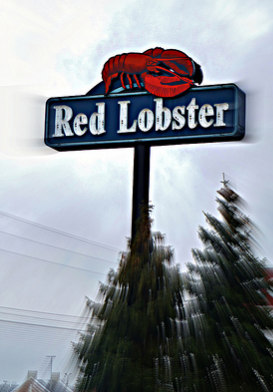Shareholder Says Darden Restaurants Sold Red Lobster Too Soon & For Too Little
You may remember that earlier this summer Darden Restaurants sold off its not-so-profitable Red Lobster chain for $2.1 billion citing slow business. Well, things might not have been so dire for the seafood chain, a new lawsuit pitting a Darden’s shareholder against the board shows.
According to CNBC, a Darden shareholder filed suit in a Florida court accusing the company’s board of directors of knowingly approving the sale of Red Lobster in order to keep their jobs despite reports that the chain was heading for a turnaround.
The lawsuit, filed by Teamsters Local 443 Health Services & Insurance Plan of Connecticut, relies heavily on a debt offering document used by Red Lobster and Darden while shopping for potential investors before the sale.
Documents note that the seafood chain suffered from short-term problems that would soon turn around and lead to higher profits.
The shareholder alleges that the debt document contains the true view of Darden’s board, and that shareholders were misled when the board publicly stated that Red Lobster’s business was in decline and needed to be sold.
“The Board sought to justify the rushed sale of Red Lobster by telling stockholders that the restaurant chain’s recent poor performance was due to intractable structural problems that would inevitably result in worsening performance in the coming quarters and years,” the suit says. “The Board knew that Red Lobster’s debt offering documents, functioning as a loan application, would be subject to rigorous scrutiny and due diligence by potential lenders.”
The suit also alleges that Darden’s board rushed the deal to sell Red Lobster so that shareholders wouldn’t be able to stop it.
“By knowingly rushing the sale of Red Lobster at an artificially low price to protect their own selfish interests in their Board memberships, each of the Director Defendants acted in bad faith and in violation of the duty of loyalty. As a result, Darden has suffered a massive loss,” the lawsuit states.
According to the complaint, Darden’s deal to sell the chain and its operating business to Golden Gate Capital for $1.6 billion after-tax was way below value. Golden Gate immediately sold the restaurant’s real estate for $1.5 billion. That would put the operating business at just $100 million, a strikingly low figure, the shareholder asserts.
CNBC reports that back in August, Darden’s board said the debt offering document didn’t reflect the company’s views and that Red Lobster’s management and been working on behalf of Golden Gate Capital.
This isn’t Darden’s only recent scuffle with a shareholder.
Less than two weeks ago, the company came under fire from shareholder Starboard Value, which is trying to wrest control away from the board, for the performance and mismanagement of the Darden-owned Olive Garden chain.
Starboard made a nearly 300-page presentation outlining its plan to turn around the Italian chain, while criticizing the restaurant’s employees of straying from policy – including overloading customers on breadsticks.
Darden shareholder sues board, citing CNBC.com report [CNBC]
Want more consumer news? Visit our parent organization, Consumer Reports, for the latest on scams, recalls, and other consumer issues.


